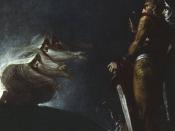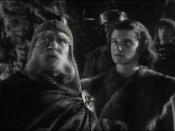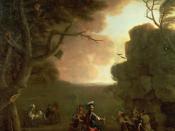Macbeth is a tragedy written by the playwright William Shakespeare for King James VI. It is about Macbeths change from brave soldier to uncaring murderer. In this essay I will be discussing whether Macbeth was responsible for his actions and his ultimate downfall.
The play starts with the three witches on a moor during a battle between the Scots and the King of Norway aided by the traitorous Thane of Cawdor. They plan to meet with Macbeth. By saying his name they associate him with evil or the supernatural. They say 'Fair is foul and foul is fair' This gives the impression of chaos and things not being what they seem which is a recurring theme throughout the play. After winning the battle Macbeth and his friend and comrade Banquo meet the witches on the moor. The witches tell them their future and Macbeth goes on a killing spree to achieve his goal of being king culminating in his demise at the hands, or rather the sword, of Macduff.
The Two Main characters are Macbeth and Lady Macbeth, his wife.
Macbeth starts out as a well-known and highly respected warrior. He is absolutely trusted by King Duncan who says of him 'O Valiant cousin, worthy gentleman.'
Also, he is respected not just by the king but by his comrades in arms as well. This is shown when an injured and bloody sergeant says to Duncan "For brave Macbeth, well he deserves that name" Soon afterwards it is shown that Macbeth is a noble and honourable Thane by showing how much he respects king Duncan when he was angry at himself at thoughts of killing Duncan when Malcolm is named successor to the throne. After killing Duncan and becoming King, Macbeth turns into a tyrant and butcher, killing many people and causing more to run away from him before he is ultimately defeated by Malcolm and Macduff's army.
In the beginning of the play Lady Macbeth is more ambitious than her husband, and wants to see them in power. She is the one who convinces Macbeth to commit murders to become more powerful. We see several instances of Lady Macbeth being much more determined to achieve her ambitions of becoming powerful and important than Macbeth. When Macbeth is first confronted with a situation where he will have to commit a murder to continue his rise to king, he struggles with the idea. He says that he is not afraid of the crime itself, but the consequences of it, "If it were done when 'tis done, then 'twere well, It were done quickly. If the assassination, Could trammel up the consequence, and catch, with his surcease success." When Lady Macbeth discovers this, however, she becomes determined to make him change his mind, manipulating him with remarkable effectiveness, dismissing all his objections. She questions his manhood and courage. This convinces Macbeth to commit the murder, despite still doubting it. Lady Macbeth's admirably strength of will is shown throughout the murder of King Duncan, as it is she who steadies her husband's nerves immediately after the murder has been commited. We also see that Lady Macbeth had tried to kill Duncan, but failed, "Had he not resembled my father as he slept, I had done 't." This shows us a less brutal and more sensitive side to her personality, and shows that beneath her ambition she is not a completely evil, power driven person. It demonstrates that she still has a conscience and that she does not find pleasure in murders, but merely uses them as a means to an end. This side of her personality is emphasized when she starts to become mad after the murder of Duncan. She ends up sleepwalking and trying to get rid of invisible blood stains on her hands before killing herself near the end.
The Witches or Weird Sisters only appear a few times during the play, yet each time they appear they create a sense of foreboding and general unpleasantness. In my opinion they are the main evil in the play, as they appear to be evil incarnate and the main reason for everything happening in the first place. The Weird Sisters are apparently very ugly as Banquo says "So withered, and so wild in their attire, that look not like th'inhabintants o'th'earth, and yet are on't? Live you? Or are you aught that man may question? You seem to understand me, By each at once her choppy finger laying upon her skinny lip: You should be women, and yet your beards forbid me to interpret that you are so." This would suggest that they are old, wrinkly hags with beards, which are probably not very nice to look at. I suppose you could call them freaks. People are afraid of so-called 'freaks' especially ones with strange powers who can tell the future. These are some of the factors that create a supernatural presence and an evil atmosphere. They continue to influence Macbeth by meeting him at various points and almost backing up their influence over him, like when Macbeth meets them on the moor again. They give him some hallucinogenic potion with "Nose of Turk and Tartar's Lips" in it. This conjures apparitions, which drive Macbeth deeper into his madness, giving him false hope, telling him half-truths and making him believe himself invincible. "â¦For none of a woman born/shall harm Macbeth" To me seems like they are saying that no one can kill him.
Macbeth's first main soliloquy is after Angus and Ross bring news that he is to be named Thane of Cawdor. He realises that the witches prophesy is coming true, and it disturbs him greatly "â¦Whose horrid image doth infix my hair and make my seated heart knock at my ribs" The next is when Malcolm is named successor to the throne, Macbeth starts wondering if murder is the only way in which he can become king. He tells the stars to hide their light, indicating that he thinks his "black" desires are too evil to be seen. Macbeth's image of the eyes not seeing what the hand is doing is significant both of his not wanting to do the deed and of him wanting the reward.
As the play progresses, Macbeth seems to become desensetised to the murders that have happened and he has few qualms about ordering the deaths of potential rivals. While the original idea to kill Duncan was Lady Macbeth's, Macbeth himself made the decisions to kill Banquo and try to kill Macduff, showing that while he was hesitant to begin with he is, towards the end, very committed to staying in power and will not let anyone get in his way.
In conclusion, I think that although Macbeth had a lot of pushing from Lady Macbeth and the Weird Sisters to carry out the first murder and therefore become king, his rise to power and ultimate downfall are largely of his own doing. While he longed for power greater than he already held he could have ignored his urges and continued as a valued and noble knight with close personal connections to Duncan, he did not have to kill Duncan and yet he chose to. Virtually condemning himself. The subsequent murders of Banquo, the slaughter of Macduff's family, and the attempt to eradicate Macduff himself were unneeded. Again, while his decisions were being influenced by outside factors from the witches and his wife, he could have chosen to ignore them and trust that none of his subjects would attempt to overthrow him therefore keeping the people on his good side and still having Banquo as his friend. So although he has been almost bullied by other people eager and ambitious for power, he made most of the decisions for himself which makes his defeat basically his own fault.






Grade A work
Good read. Touched on all aspects of topic, well done.
Would classify as 11th
0 out of 0 people found this comment useful.